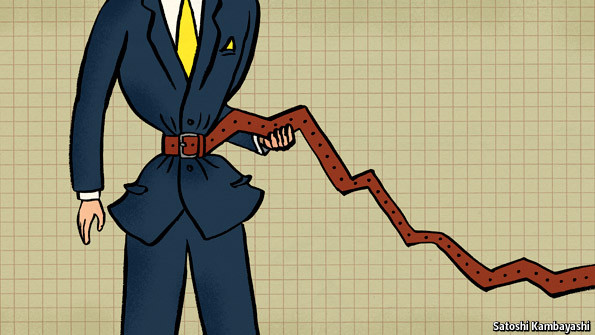Buttonwood: Let’s get fiscal, A new book from a prescient economist, The Economist, 19 Δεκεμβρίου 2014.
What is the Japanese word for Schadenfreude? For much of the late 1990s and early 2000s, Western economists and politicians were happy to lecture the Japanese government about the mistakes it made in the aftermath of its asset bubble. But six years after the collapse of Lehman Brothers, the investment bank whose demise triggered the financial crisis, many Western economies are still struggling to generate decent growth. Their central banks are being forced to keep interest rates close to zero. Yields on government bonds in Europe, as in Japan, have sunk to record lows. Some economists are talking of a new era of “secular stagnation”.
A new book* from Richard Koo of the Nomura Research Institute argues that the West has made glaring errors too. “We are experiencing not only an economic crisis but also a crisis in economics,” he writes. “Most economists failed to predict the current crisis and the economics profession itself has fallen into a state of complete disarray in its attempt to answer the question of what should be done.”
Mr Koo argues that the 2008 downturn was what he dubs a “balance-sheet recession”. This occurs when the private sector has borrowed heavily to invest in assets (particularly property); when asset prices decline, the nominal value of the debt remains. Cutting interest rates helps a bit (by reducing the cost of servicing the debt) but it does not persuade people to borrow more money, because they are still trying to repair their balance-sheets. “Private sectors in most countries in the West today are minimising debt or maximising savings in spite of zero interest rates, behaviour that is at total odds with traditional theory,” he writes.
This makes monetary policy much less effective. The policy of quantitative easing (QE), the creation of money to buy assets, succeeded in expanding the balance-sheets of central banks but did not push up bank lending or boost the amount of money circulating among companies and consumers. That explains why QE has not resulted in the hyperinflation that some feared and also, in Mr Koo’s view, why QE has not been very effective.
Σχετικές αναρτήσεις:
- Wolff, Β. G. (2014) “Lessons from the Bank of Japan for the euro area – Q3 data seem to confirm the fear that the Bank of Japan would miss its target“, Bruegel Institute, 18 Νοεμβρίου.
- Gilbert, Μ. (2014) “ECB Needs Japanese Lessons“, Bloomberg View, 05 Νοεμβρίου.
- Walker, M. (2014) “Europe Is Closely Studying Lessons from Japan – They Fear Euro Zone Is Falling Into Similar Lethargy”, The Wall Street Journal, 29 Ιουνίου.




